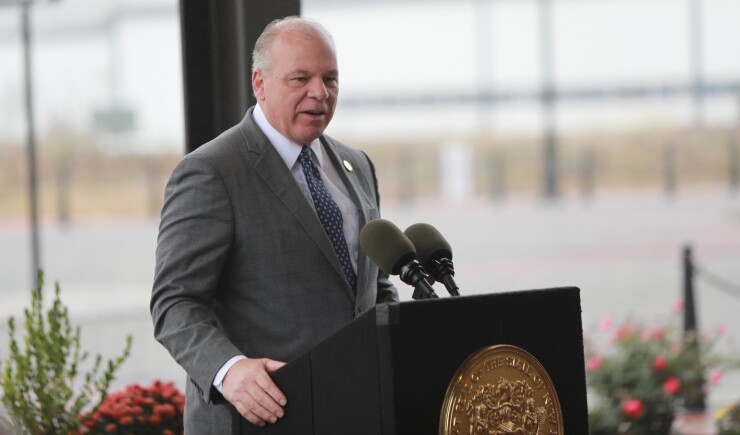Two New Jersey political rivals have teamed up on a health benefits saving plan that promises hundreds of millions in yearly savings to school districts statewide.
The New Jersey Education Association and Senate President Steve Sweeney, D-Gloucester, after nearly a decade of clashes stemming from a 2011 pension overhaul, announced Monday a proposal they said would reduce school district and employee healthcare costs by $1 billion annually.
The proposed deal would generate around $614 million in annual savings to the Garden State’s school districts, they say, at a time when many are facing budgetary challenges from state aid cuts and limits from property tax caps.

“This agreement is a result of several months of intense negotiations and represents the culmination of several years of efforts to identify opportunities to address the quality of healthcare while dealing with the reality of skyrocketing costs,” Sweeney said at a statehouse news conference with NJEA president Marie Blistan. “This has been a long, long journey.”
The NJEA’s previous feud with Sweeney stems back to 2011 when the Democratic lawmaker teamed with former Republican Gov. Chris Christie on pension changes vehemently opposed by the powerful teachers union.
Union leaders later attacked Sweeney in 2016 for not following through on a promise to pursue a constitutional amendment that would have mandated quarterly pension payments to its members. Sweeney then accused the NJEA of extortion for threatening to withhold campaign contributions if the pension measure didn’t reach the November 2016 ballot and the union backed Sweeney’s Republican opponent during his 2017 reelection campaign.
The deal brokered between Sweeney and Blistan would allow existing teachers who opt for one of two new, lower-cost plans to make healthcare contributions based on a percentage of their salaries instead of a share of their premiums under the 2011 health benefits reform law known as Chapter 78. Those who elect to stay in their existing healthcare plan would be required to pay higher premiums. New hires would have to elect one of the new plans.
“This has been the culmination of a very long process and it wasn’t easy, but the work we have done together is a major victory for both our members and all the other taxpayers in the state of New Jersey,” Blistan said. “It is another example of the kind of win-win solutions we can achieve when we come together determined to make progress.”
Fitch Ratings senior director Marcy Block said that many New Jersey school districts are grappling with fiscal pressures resulting from declines in state aid amid the state government confronting competing priorities for items like pension funding and transportation spending. Block said if the proposal becomes reality it could be a credit positive for school districts that get more budget flexibility from the health savings as well as the state because of facing less pressure to doll out increased public school dollars. She added that the thawing of past strains between Sweeney and Blistan is also beneficial for New Jersey in terms of laying a foundation for possible future benefit savings.
“It is a real positive that the education association is working closely with the Senate president,” Block said. “It is a path they have not previously been able to go down.”
Past structurally imbalanced budgets coupled with a deep pension burden triggered 11 bond rating downgrades to New Jersey between 2011 and 2017. The Garden State’s general obligation debt is rated A3 by Moody’s Investors Service, A-minus by S&P, and A by Fitch Ratings and Kroll Bond Rating Agency. Only Illinois has lower GO ratings among the 50 U.S. states.
Sweeney previously pushed for more aggressive public-worker health insurance changes outlined in an August 2018 “Path to Progress” report that would have shifted employees from platinum-grade health-care plans under the Affordable Care Act to higher level gold-level plans. Assembly Speaker Craig Coughlin, D- Fords, pursued another healthcare savings plan last year backed by the NJEA that Sweeney opposed since it would have only produced around $300 million in taxpayer savings.
The NJEA proposal would need to be approved by the state Senate and Assembly before getting signed by Gov. Phil Murphy, a Democrat who was strongly supported by the teacher’s union during his 2017 gubernatorial run. Murphy’s press secretary, Alyana Alfaro, did not indicate whether the governor would support Sweeney’s measure.
“Governor Murphy has long believed that good-faith negotiations with our workforce are the best strategy for reducing health care costs without sacrificing quality,” Alfaro said in a statement. The Governor looks forward to reviewing the proposal put forward…and working together to finally give our educators the long-overdue Chapter 78 relief they deserve.”
Coughlin said in a statement he urged Sweeney and NJEA leadership to meet last year and has been focused on cutting healthcare costs that put the state on “on a more fiscally responsible path” while also being fair to educators.
“While the Assembly will review this legislation as thoroughly as we review any other, I am confident that today marks yet another important step in my efforts to create long-term fiscal savings for New Jersey’s taxpayers,” Coughlin said.
Seton Hall University political science professor Matt Hale said he hopes the deal struck between Sweeney and Blistan bodes well for lawmakers partnering with other unions to craft savings to benefit the state and localities. He noted that Sweeney has recently demonstrated a willingness to soften his previous stances such as offering a compromise with Murphy on a
“I never thought I would see them in the same room let alone the same podium,” said Hale of Sweeney and Blistan’s announced agreement. “This is an example of pragmatic politics.”





